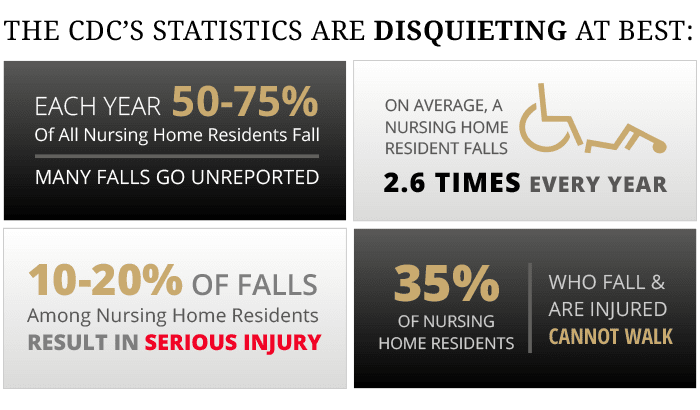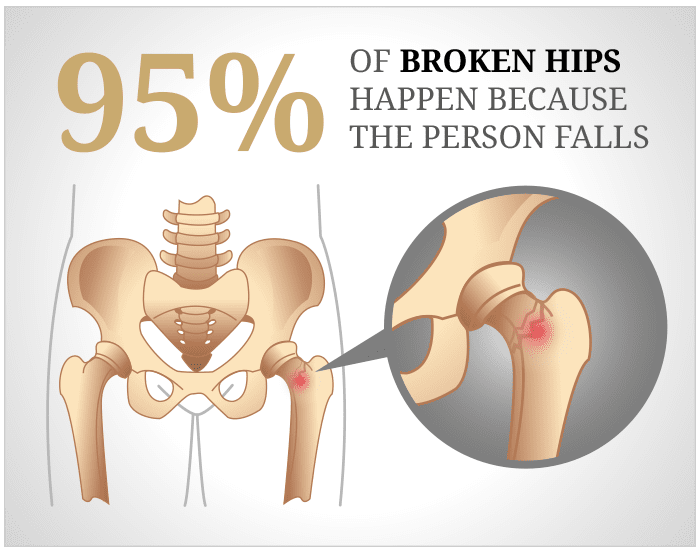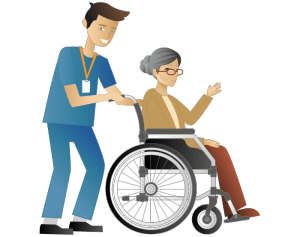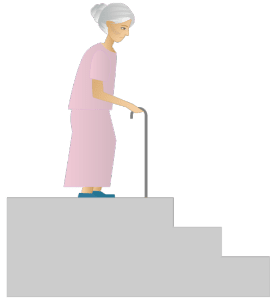This blog explores the prevalence and risks of falls in nursing homes, as well as strategies to prevent them. Falls can cause serious injuries among older adults, with nursing home falls leading to approximately 1,800 deaths annually. A multifaceted approach to fall prevention includes comprehensive assessments and individualized care planning by nursing home staff.
If an elderly person you care about is about to move to a nursing home or already resides in a long-term residential care facility, you might need to ask the management about their fall prevention practices.
Falls cause millions of adults aged 65 and older to suffer injuries such as hip fractures and traumatic brain injury (TBI), according to the Centers for Disease Control (CDC) and Prevention. Between 2007 and 2016 the rate of death occurring from falls by older adults increased by 30%. At this rate, as many as 7 deaths every hour could occur by 2030. More specifically, falls in nursing homes lead to about 1,800 deaths among the elderly each year, the CDC says.

The CDC says nursing home residents who fall frequently sustain injuries that result in permanent disability and reduced quality of life. Typical injuries are fractures and head trauma. Falls are the most common cause of traumatic brain injuries (TBIs), and 81 percent of TBIs in adults who are 65 and older happen because of a fall.

A broken hip is often the reason an elderly person enters a nursing home. Residents of nursing homes suffer broken bones in falls as well. Nearly all broken hips (95 percent) happen because the person falls. People with hip fractures require surgery, which may include a full or partial hip implant, and extensive physical rehabilitation during convalescence, usually in a nursing home. According to the CDC, 20 percent of hip fracture patients die within a year of being injured.
Be proactive and optimize settings to avoid falls. A falls management program for nursing homes published by the federal Agency for Healthcare Research and Quality (AHRQ) says falls are due to person-centered factors and external factors, including:
 Effects of aging and/or inactivity on balance, gait, and strength
Effects of aging and/or inactivity on balance, gait, and strengthAs the AHRQ says, aging and illness may not be preventable, but they can be managed. Environmental factors that increase the risk of falls in nursing homes can be addressed. The Agency suggests a multifaceted approach that includes comprehensive fall assessment and individualized care planning conducted by a team of organizational support and management personnel.
In other words, a nursing home’s management and staff must make a concerted effort if there are to be fewer falls among residents. It starts, says the AHRQ, with a “culture of safety.” The agency manual outlines an eight-point protocol for investigating falls, since a resident who falls once is likely to fall again, and following up with an individual plan of care for the resident my help prevent a fall.
A discussion of strategies to reduce falls published by the Annals of Long-Term Care agrees with the proposition that there are multiple factors in nursing home falls and that preventing them requires an interdisciplinary approach. In addition to determining why a fall has occurred, the authors suggest several general strategies for reducing the incidence of falls in nursing homes. They include:
Other more individualized measures that may be taken include:
 The strategies above are in addition to obvious measures such as proper lighting, uncluttered living areas, generous use of grab bars and handrails, properly securing or eliminating area rugs and mats to ensure against slipping, and maintaining the premises to eliminate loose, broken or otherwise unsafe flooring.
The strategies above are in addition to obvious measures such as proper lighting, uncluttered living areas, generous use of grab bars and handrails, properly securing or eliminating area rugs and mats to ensure against slipping, and maintaining the premises to eliminate loose, broken or otherwise unsafe flooring.
In some cases, a nursing home resident who has fallen and been injured is a victim of neglect. Either the resident’s risk of falling was not properly assessed and/or protective measures indicated by the resident’s condition were not taken, or the home itself in some way is unsafe.
The lawyers of the Becker Law Office work to assist nursing home residents and their families when nursing home neglect leads to harm. We can help you report problems to Kentucky, Indiana, or Ohio authorities, and we can investigate independently to document and put an end to dangerous practices. In many cases, we can recover damages to compensate you for medical expenses and other costs assumed due to the assistance your injured loved one requires.
If you suspect nursing home neglect, please contact the Becker Law Office at (502) 333-3333or online as soon as possible for assistance.